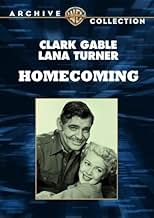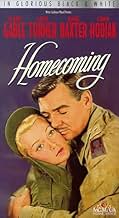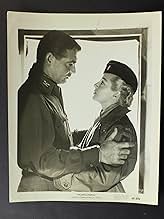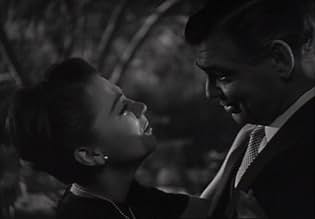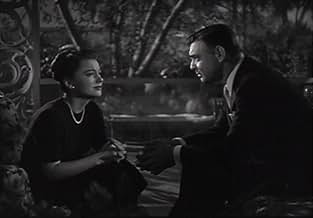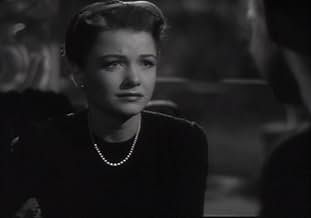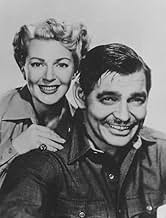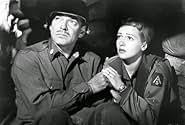IMDb RATING
6.8/10
1.2K
YOUR RATING
At the end of WW2, aboard a repatriation ship, an Army doctor reminisces about his war years while being interviewed by a reporter.At the end of WW2, aboard a repatriation ship, an Army doctor reminisces about his war years while being interviewed by a reporter.At the end of WW2, aboard a repatriation ship, an Army doctor reminisces about his war years while being interviewed by a reporter.
- Director
- Writers
- Stars
- Awards
- 4 wins total
John Albright
- Corpsman
- (uncredited)
Frank Arnold
- Maitre d'Hotel
- (uncredited)
Peggy Badley
- Nurse Betty Simpson
- (uncredited)
Art Baker
- Williams, Reporter on Transport Ship
- (uncredited)
Gregg Barton
- Captain
- (uncredited)
Nanette Bordeaux
- Nurse
- (uncredited)
- Director
- Writers
- All cast & crew
- Production, box office & more at IMDbPro
Featured reviews
What a gem this story is! Here you will find no platitudes; no heroes 10 feet tall; no heels - most of all no heels. This is about the most caring, life-affirming story you are ever going to find, and it is done without any syrup, nor any gratuitous and tiresome acting-out of missteps.
There is a a single scene near the end which implies that a single misstep MAY have been committed, but sorry to tell you, you are going to have to work out for yourself what did or didn't happen, because it's not spelled out. It was brave rather than a cop-out to present a pivotal scene that way.
The film is technically excellent. The scene composition is superb. You have never seen a WW2 field hospital so meticulously and realistically re-created. There is a scene viewed through the door of a tent where someone walks away that is so amazingly technically well done (as well as evocative) as to be amazing. I can't tell you that the snow falling in that scene was real, but it LOOKED absolutely real. The fadeout as the figure walked gradually into the falling snow was perfect. It's a little thing that a film nut notices, because it's hard to do.
The messages are about finding one's humanity, daring to need, and daring to reach out to someone to need you back. By the end, you may find yourself touched so deeply as to be shaking.
There is a a single scene near the end which implies that a single misstep MAY have been committed, but sorry to tell you, you are going to have to work out for yourself what did or didn't happen, because it's not spelled out. It was brave rather than a cop-out to present a pivotal scene that way.
The film is technically excellent. The scene composition is superb. You have never seen a WW2 field hospital so meticulously and realistically re-created. There is a scene viewed through the door of a tent where someone walks away that is so amazingly technically well done (as well as evocative) as to be amazing. I can't tell you that the snow falling in that scene was real, but it LOOKED absolutely real. The fadeout as the figure walked gradually into the falling snow was perfect. It's a little thing that a film nut notices, because it's hard to do.
The messages are about finding one's humanity, daring to need, and daring to reach out to someone to need you back. By the end, you may find yourself touched so deeply as to be shaking.
As a rule I'm not much into romantic films, but there are exceptions and Homecoming is one of them.
Clark Gable and Lana Turner did four films together and this is the third one. It's Turner's show here. It's a great tribute to her charisma and star quality that she looks incredibly sexy in those army fatigues she has to wear as per the plot. Lana Turner in her
younger days had a quality of winsomeness that was never showcased than when she plays Jane "Snapshot" McCall, idealistic army nurse.
In this cynical age we would look with incredulity that a widow with a young son would follow her late husband off to war because his ideals became her ideals. Yet Turner makes you believe that in this film.
The plot is simply Clark Gable, very successful doctor in a small mid-west city, goes to World War II basically because its expected of him. He's a self centered guy, nice home, loving wife played very well by Anne Baxter, all the material things you could want and not a clue about why we are in World War II. He has a fellow physician friend, John Hodiak who does a lot of pro bono public service work who tries to act as a conscience, but fails. I guess Turner had something to offer Hodiak didn't.
At first Dr. Ulysses Johnson (Gable) and Nurse McCall don't hit it off after she's assigned to him as a nurse. But her beauty and idealism get to him he falls for her big time.
Because its 1948 Hollywood and Anne Baxter is by no means a bad person there was no way Turner was going to wind up with Gable in the end. She has to die, but Turner is given a death scene that is one of the most moving in the history of film. You have to be made of stone not to be touched by her and Gable at her bedside.
John Hodiak, a very talented and almost forgotten figure today is also terrific as Gable's friend Dr. Robert Sunday. Gable will be working with Hodiak at the clinic Hodiak has in a poor neighborhood and he will be doing it because of the social conscience Turner has instilled in him.
There are no bad people in this film except the Nazis shooting at Gable Turner and the rest of Eisenhower's army.
I believe this is Lana Turner's best film and fans of her's should not miss this one.
Clark Gable and Lana Turner did four films together and this is the third one. It's Turner's show here. It's a great tribute to her charisma and star quality that she looks incredibly sexy in those army fatigues she has to wear as per the plot. Lana Turner in her
younger days had a quality of winsomeness that was never showcased than when she plays Jane "Snapshot" McCall, idealistic army nurse.
In this cynical age we would look with incredulity that a widow with a young son would follow her late husband off to war because his ideals became her ideals. Yet Turner makes you believe that in this film.
The plot is simply Clark Gable, very successful doctor in a small mid-west city, goes to World War II basically because its expected of him. He's a self centered guy, nice home, loving wife played very well by Anne Baxter, all the material things you could want and not a clue about why we are in World War II. He has a fellow physician friend, John Hodiak who does a lot of pro bono public service work who tries to act as a conscience, but fails. I guess Turner had something to offer Hodiak didn't.
At first Dr. Ulysses Johnson (Gable) and Nurse McCall don't hit it off after she's assigned to him as a nurse. But her beauty and idealism get to him he falls for her big time.
Because its 1948 Hollywood and Anne Baxter is by no means a bad person there was no way Turner was going to wind up with Gable in the end. She has to die, but Turner is given a death scene that is one of the most moving in the history of film. You have to be made of stone not to be touched by her and Gable at her bedside.
John Hodiak, a very talented and almost forgotten figure today is also terrific as Gable's friend Dr. Robert Sunday. Gable will be working with Hodiak at the clinic Hodiak has in a poor neighborhood and he will be doing it because of the social conscience Turner has instilled in him.
There are no bad people in this film except the Nazis shooting at Gable Turner and the rest of Eisenhower's army.
I believe this is Lana Turner's best film and fans of her's should not miss this one.
Clark Gable, Lana Turner, Anne Baxter, John Hodiak, and Gladys Cooper star in "Homecoming," a 1948 film about wartime and its aftermath. Gable plays a surgeon, Lee, who falls for a nurse (Turner) with whom he puts together the wounded, endures a life with only the barest of necessities, sits in shelters, and dodges. Back home, his devoted wife (Baxter) realizes by reading his letters that she's losing him.
World War II has been romanticized often in films and in music - somehow, it is perceived by people who lived through Vietnam, Desert Storm, and our current conflicts as being somehow a cleaner war. But no war is clean, and there were some homecomings that were difficult as well. This was touched upon in "The Best Years of Our Lives," and very well here.
The story is brought to life by its players. The role of Snapshot the nurse is a different one for the glamorous and beautiful Turner than what she was normally handed - the curse of the beautiful in Hollywood. She was capable of much more, and she gives a strong performance as an outspoken soldier who finally lets her vulnerability show. The stalwart Gable gives us a man who realizes the detached attitude he had toward his patients at home will no longer work, and he has to rethink himself and his life. Baxter is the "one left out," who can't experience the war, and she gives an excellent portrayal of a woman who loves her husband but doesn't know what to expect from him when he comes home. "I know he's changed," she laments, "but why couldn't we have changed together?" Her real-life husband, John Hodiak, looks quite handsome but doesn't have much to do as a family friend - his brief brush with stardom was a few years away.
A very nice movie that shows that homecoming can be uncomfortable and bittersweet.
World War II has been romanticized often in films and in music - somehow, it is perceived by people who lived through Vietnam, Desert Storm, and our current conflicts as being somehow a cleaner war. But no war is clean, and there were some homecomings that were difficult as well. This was touched upon in "The Best Years of Our Lives," and very well here.
The story is brought to life by its players. The role of Snapshot the nurse is a different one for the glamorous and beautiful Turner than what she was normally handed - the curse of the beautiful in Hollywood. She was capable of much more, and she gives a strong performance as an outspoken soldier who finally lets her vulnerability show. The stalwart Gable gives us a man who realizes the detached attitude he had toward his patients at home will no longer work, and he has to rethink himself and his life. Baxter is the "one left out," who can't experience the war, and she gives an excellent portrayal of a woman who loves her husband but doesn't know what to expect from him when he comes home. "I know he's changed," she laments, "but why couldn't we have changed together?" Her real-life husband, John Hodiak, looks quite handsome but doesn't have much to do as a family friend - his brief brush with stardom was a few years away.
A very nice movie that shows that homecoming can be uncomfortable and bittersweet.
Movies like this one are discoveries. Mervyn LeRoy was a director that always knew where to go for a good story and get amazing performances out of his actors. In this film he demonstrates how to create a movie that holds the viewer's attention. It is based on a story by Sidney Kingsley and was adapted by Jan Lustig.
The movie shows the American cinema at its best as it combines a look to WWII and a forbidden love, something that probably had a hard time passing the censor's scissors. Mr. LeRoy makes the picture highly engrossing because of the way he presents the story. Men and women, for the first time were in the front lines; the men as combatants, or in this case, a doctor and the women as nurses, or filling in for the jobs the men couldn't do because they did the fighting.
Clark Gable was an actor that made this picture the joy it is to watch by making us believe he is this surgeon, Dr. Lee Johnson, a man that awakes to reality when he has to deal first hand with treating the wounded soldiers. Mr. Gable casts such a virile shadow in his best work that we know where he stood all the time. His Dr. Johnson shows the strain of the stress of war, the loyalty to his wife at home and the sudden love he finds for "Snapshot" McCall. He remains throughout the film focused in helping the soldiers, until the passion he feels for his nurse, gets the best of him.
Lana Turner is the real surprise of the movie. She is playing a role that probably would not have been offered to her because of the heat and glamour she projected. Her nurse McCall is a woman that life has made a cynic because of the tragedy in her own life and the fact that she is separated from her young son. The magnetism between Ms. Turner and Mr. Gable is what keeps us interested in the movie. Lana Turner shows she had the potential for playing dramatic parts that were not offered to her; she was type-casted as the siren, or the sophisticate in most of her work, but she had the range and the potential that probably only Mr. LeRoy, who discovered Ms. Turner, saw she had. Only a director like Mr. LeRoy could elicit this performance from Ms. Turner.
Anne Baxter is the wife that stays home hoping her man will come back alive. Her Penny Johnson makes her appear as insecure because she perceives her husband's affection might lie with the nurse that he complains to her at the beginning of his correspondence. John Hodiak plays the friend, Dr. Sunday, a man who has his feet on the ground and believes he should help the poor people of his area, instead of the society types that Dr. Johnson attracts.
The movie is satisfying because is tells a good story with characters one is easily identified with. Mr. LeRoy was the one that got all the elements together and gave us this classic film that is timeless.
The movie shows the American cinema at its best as it combines a look to WWII and a forbidden love, something that probably had a hard time passing the censor's scissors. Mr. LeRoy makes the picture highly engrossing because of the way he presents the story. Men and women, for the first time were in the front lines; the men as combatants, or in this case, a doctor and the women as nurses, or filling in for the jobs the men couldn't do because they did the fighting.
Clark Gable was an actor that made this picture the joy it is to watch by making us believe he is this surgeon, Dr. Lee Johnson, a man that awakes to reality when he has to deal first hand with treating the wounded soldiers. Mr. Gable casts such a virile shadow in his best work that we know where he stood all the time. His Dr. Johnson shows the strain of the stress of war, the loyalty to his wife at home and the sudden love he finds for "Snapshot" McCall. He remains throughout the film focused in helping the soldiers, until the passion he feels for his nurse, gets the best of him.
Lana Turner is the real surprise of the movie. She is playing a role that probably would not have been offered to her because of the heat and glamour she projected. Her nurse McCall is a woman that life has made a cynic because of the tragedy in her own life and the fact that she is separated from her young son. The magnetism between Ms. Turner and Mr. Gable is what keeps us interested in the movie. Lana Turner shows she had the potential for playing dramatic parts that were not offered to her; she was type-casted as the siren, or the sophisticate in most of her work, but she had the range and the potential that probably only Mr. LeRoy, who discovered Ms. Turner, saw she had. Only a director like Mr. LeRoy could elicit this performance from Ms. Turner.
Anne Baxter is the wife that stays home hoping her man will come back alive. Her Penny Johnson makes her appear as insecure because she perceives her husband's affection might lie with the nurse that he complains to her at the beginning of his correspondence. John Hodiak plays the friend, Dr. Sunday, a man who has his feet on the ground and believes he should help the poor people of his area, instead of the society types that Dr. Johnson attracts.
The movie is satisfying because is tells a good story with characters one is easily identified with. Mr. LeRoy was the one that got all the elements together and gave us this classic film that is timeless.
Ulysses ,what a name for a major whose odyssey took place in WW2,who learned after his "voyage" that success is no success at all,that selfishness leads to nowhere and that a doctor's work is to help his fellow men;we are not far from Stahl's "magnificent obsession" in which a reckless playboy was told that a man (Jesus ) had given his life so man was saved .
It's strange that the world Ulysse lives in is full of altruistic persons ,from "Snapshot" the nurse who never has a rest till all the wounded soldiers are operated to the Chester doctor (Hodiak) whose war has begun long before WW2,and from "Monk" the unfortunate soldier to the good doctor Sunday (again,what a name!).The US army looks more like Salvation Army! The title is partly a misnomer because it's essentially a long flashback (actually several flashbacks) dealing with the hard life of a military medical team in the war.Thus Gable is torn between his faithful wife (Anne Baxter) and his courageous nurse (their relationship is much too predictable).Best scene is perhaps the "Roman " bath :we feel that Gable is very human when she takes her bath and he 's got to force himself to stay calm and not to have a little look !
It's strange that the world Ulysse lives in is full of altruistic persons ,from "Snapshot" the nurse who never has a rest till all the wounded soldiers are operated to the Chester doctor (Hodiak) whose war has begun long before WW2,and from "Monk" the unfortunate soldier to the good doctor Sunday (again,what a name!).The US army looks more like Salvation Army! The title is partly a misnomer because it's essentially a long flashback (actually several flashbacks) dealing with the hard life of a military medical team in the war.Thus Gable is torn between his faithful wife (Anne Baxter) and his courageous nurse (their relationship is much too predictable).Best scene is perhaps the "Roman " bath :we feel that Gable is very human when she takes her bath and he 's got to force himself to stay calm and not to have a little look !
Did you know
- TriviaAccording to the AFI catalog entry for this film, for the battle scenes in Italy, MGM constructed five 35-foot towers, a full-sized evacuation hospital, and more than 100 Army tents at the Lasky-Mesa movie ranch 35 miles outside of Hollywood. The set took three weeks to build and the scenes used hundreds of extras, five cameras, and six assistant directors. This was all for a re-creation of the historic capture of the Anzio beachhead in Italy by U.S. and British forces on January 22, 1944.
- GoofsAt the end, Penny Johnson says she followed her husband's movements on a map. During World War II, people in the military had it drilled into them that they could not say anything about where they were in letters sent back home, and to make sure they kept that rule, the mail from soldiers was censored. This has been mentioned in numerous histories of World War II. With Clark Gable being an officer, it's even less likely any information about his movements around Europe would have been available to his wife.
- ConnectionsEdited from La valse dans l'ombre (1940)
Details
- Release date
- Country of origin
- Language
- Also known as
- Renunciación
- Filming locations
- Production company
- See more company credits at IMDbPro
Box office
- Budget
- $2,654,000 (estimated)
- Runtime1 hour 53 minutes
- Color
- Aspect ratio
- 1.37 : 1
Contribute to this page
Suggest an edit or add missing content



